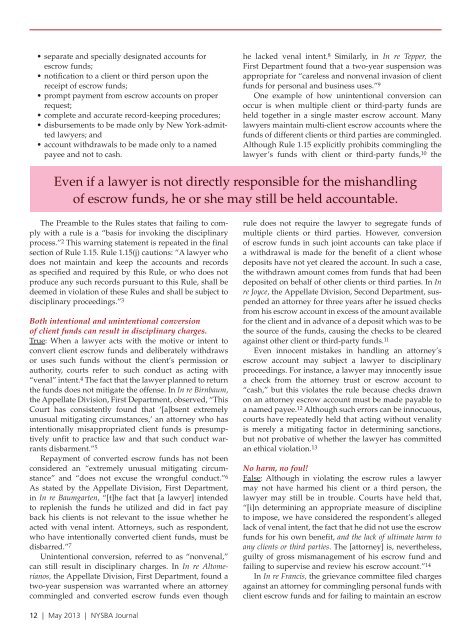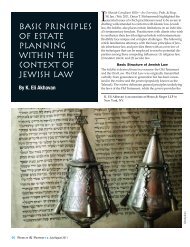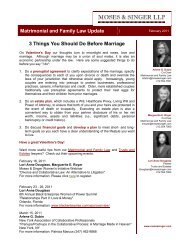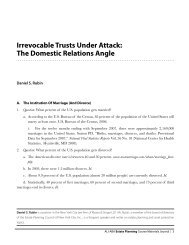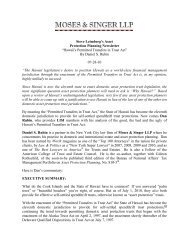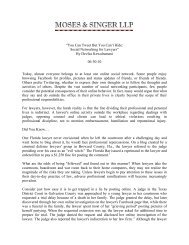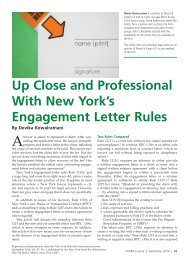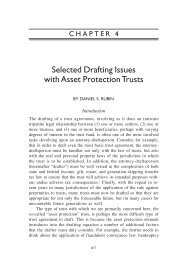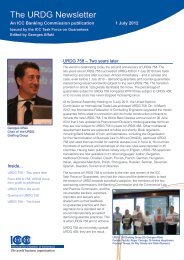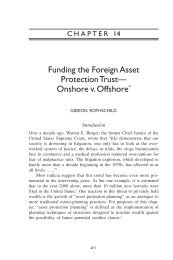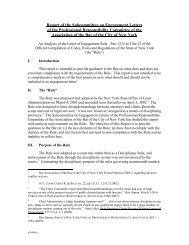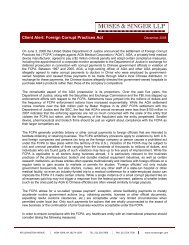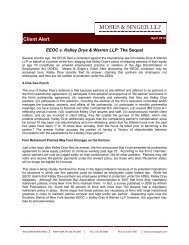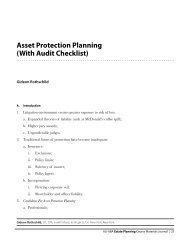Create successful ePaper yourself
Turn your PDF publications into a flip-book with our unique Google optimized e-Paper software.
• separate and specially designated accounts forescrow funds;• notification to a client or third person upon thereceipt of escrow funds;• prompt payment from escrow accounts on properrequest;• complete and accurate record-keeping procedures;• disbursements to be made only by New York-admittedlawyers; and• account withdrawals to be made only to a namedpayee and not to c<strong>as</strong>h.he lacked venal intent. 8 Similarly, in In re Tepper, theFirst Department found that a two-year suspension w<strong>as</strong>appropriate for “careless and nonvenal inv<strong>as</strong>ion of clientfunds for personal and business uses.” 9One example of how unintentional conversion canoccur is when multiple client or third-party funds areheld together in a single m<strong>as</strong>ter escrow account. Manylawyers maintain multi-client escrow accounts where thefunds of different clients or third parties are commingled.Although Rule 1.15 explicitly prohibits commingling thelawyer’s funds with client or third-party funds, 10 theEven if a lawyer is not directly responsible for the mishandlingof escrow funds, he or she may still be held accountable.The Preamble to the Rules states that failing to complywith a rule is a “b<strong>as</strong>is for invoking the disciplinaryprocess.” 2 This warning statement is repeated in the finalsection of Rule 1.15. Rule 1.15(j) cautions: “A lawyer whodoes not maintain and keep the accounts and records<strong>as</strong> specified and required by this Rule, or who does notproduce any such records pursuant to this Rule, shall bedeemed in violation of these Rules and shall be subject todisciplinary proceedings.” 3Both intentional and unintentional conversionof client funds can result in disciplinary charges.True: When a lawyer acts with the motive or intent toconvert client escrow funds and deliberately withdrawsor uses such funds without the client’s permission orauthority, courts refer to such conduct <strong>as</strong> acting with“venal” intent. 4 The fact that the lawyer planned to returnthe funds does not mitigate the offense. In In re Birnbaum,the Appellate Division, First Department, observed, “ThisCourt h<strong>as</strong> consistently found that ‘[a]bsent extremelyunusual mitigating circumstances,’ an attorney who h<strong>as</strong>intentionally misappropriated client funds is presumptivelyunfit to practice law and that such conduct warrantsdisbarment.” 5Repayment of converted escrow funds h<strong>as</strong> not beenconsidered an “extremely unusual mitigating circumstance”and “does not excuse the wrongful conduct.” 6As stated by the Appellate Division, First Department,in In re Baumgarten, “[t]he fact that [a lawyer] intendedto replenish the funds he utilized and did in fact payback his clients is not relevant to the issue whether heacted with venal intent. Attorneys, such <strong>as</strong> respondent,who have intentionally converted client funds, must bedisbarred.” 7Unintentional conversion, referred to <strong>as</strong> “nonvenal,”can still result in disciplinary charges. In In re Altomerianos,the Appellate Division, First Department, found atwo-year suspension w<strong>as</strong> warranted where an attorneycommingled and converted escrow funds even thoughrule does not require the lawyer to segregate funds ofmultiple clients or third parties. However, conversionof escrow funds in such joint accounts can take place ifa withdrawal is made for the benefit of a client whosedeposits have not yet cleared the account. In such a c<strong>as</strong>e,the withdrawn amount comes from funds that had beendeposited on behalf of other clients or third parties. In Inre Joyce, the Appellate Division, Second Department, suspendedan attorney for three years after he issued checksfrom his escrow account in excess of the amount availablefor the client and in advance of a deposit which w<strong>as</strong> to bethe source of the funds, causing the checks to be clearedagainst other client or third-party funds. 11Even innocent mistakes in handling an attorney’sescrow account may subject a lawyer to disciplinaryproceedings. For instance, a lawyer may innocently issuea check from the attorney trust or escrow account to“c<strong>as</strong>h,” but this violates the rule because checks drawnon an attorney escrow account must be made payable toa named payee. 12 Although such errors can be innocuous,courts have repeatedly held that acting without venalityis merely a mitigating factor in determining sanctions,but not probative of whether the lawyer h<strong>as</strong> committedan ethical violation. 13No harm, no foul!False: Although in violating the escrow rules a lawyermay not have harmed his client or a third person, thelawyer may still be in trouble. Courts have held that,“[i]n determining an appropriate me<strong>as</strong>ure of disciplineto impose, we have considered the respondent’s allegedlack of venal intent, the fact that he did not use the escrowfunds for his own benefit, and the lack of ultimate harm toany clients or third parties. The [attorney] is, nevertheless,guilty of gross mismanagement of his escrow fund andfailing to supervise and review his escrow account.” 14In In re Francis, the grievance committee filed chargesagainst an attorney for commingling personal funds withclient escrow funds and for failing to maintain an escrow12 | May 2013 | NYSBA Journal


